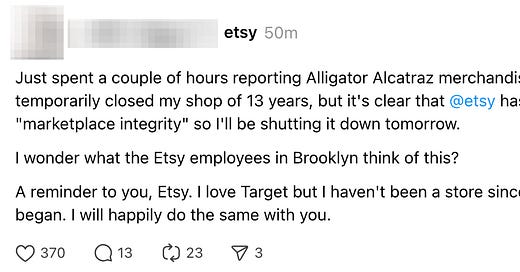Social media was in an uproar today when it was discovered that several users were selling “Alligator Alcatraz” merchandise. Some were calling for a boycott while some had alternative suggestions such as reporting each individual item for sale.
So what’s the right move for Etsy?
Keep in mind that Target has reportedly lost $12.4 billion in market value due to consumer backlash, boycotting and shifting sales trends. YIKES. (I have to believe some corporations out there are taking note.)
To be fair, as I write this, the word is out that Etsy is taking these items down. But similar circumstances have occurred in the past where people found antisemitic and/or other hateful merch in their marketplace.
I’ll tell you what set me off on it — someone was asking whom to contact at corporate to push Etsy to act and I did some digging. It led me to the CMO on LinkedIn and this is his banner image:
When I saw “keep commerce human,” I was, to be frank, grossed out. There is literally NOTHING human about “Alligator Alcatraz.” Isn’t this Marketing Exec concerned about his and his company’s brand image? I hope he’s had a very busy day.
Political and cultural controversies aside, Etsy is still quite flawed. Sellers often leave the platform due to increasing fees, restrictive policies, and a lack of control over their own shops. Many also feel that Etsy prioritizes mass-produced goods over handmade or small-batch items, undermining the original spirit of the marketplace.
From a consumer side, boycotting Etsy altogether may not be fair. Etsy is a platform that hosts millions of independent sellers. Holding the entire platform accountable for the actions of a few doesn’t reflect the diversity of the community or the range of products offered. Let’s remember how important it is to “shop small.” And with millions of listings, it's challenging for any platform to catch every item immediately. Etsy does rely on community reporting and may take action once aware—so boycotting instead of encouraging improvement may reduce pressure for constructive change. And then what? Boycott Shop? Shopify? Amazon? Pinterest?
Maybe there is no solution that covers everyone and everything here.
But what can Etsy do to repair their own reputation in moments like this?
Proactive communication: Issue a clear, values-driven statement that reaffirms Etsy’s commitment to creative freedom, inclusion, and community guidelines but emphasize that Etsy does not endorse individual listings, and clarify how its policies work.
Demonstrate accountability: Sometimes people just want to know they are being heard. Acknowledge concerns without being defensive and share the steps being taken while also highlighting Etsy’s reporting system and how it works.
Spotlight what’s working well: Bring attention to ethical sellers and creators who reflect Etsy’s values, showing the diversity and integrity of the platform.
Transparent enforcement: This is a big one IMO. And do it quickly. Publicize when Etsy removes listings or bans sellers in violation of its policies to build trust that action is taken. Take that a step further, perhaps, and publish a quarterly "transparency report" outlining enforcement statistics and trends. (Maybe this is only for investors. I don’t know.)
Long term, there always needs to be consistent media outreach as well. Interviews and op-eds from Etsy’s leadership; stories about positive seller impact, innovation, and community initiatives; “humble brag” about community and social action.
But listen, simply put, to all of you, REPORT THESE ITEMS. On ANY platform. This is garbage content on the wrong side of history. REPORT. REPORT. REPORT.
And now, I shall step down off my soapbox. I need a snack.








